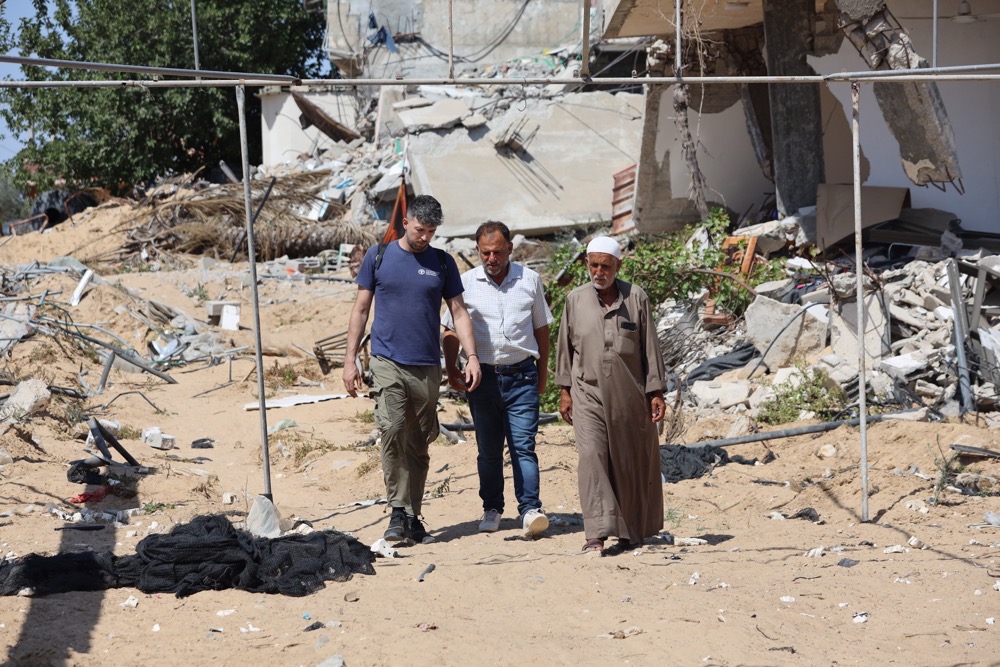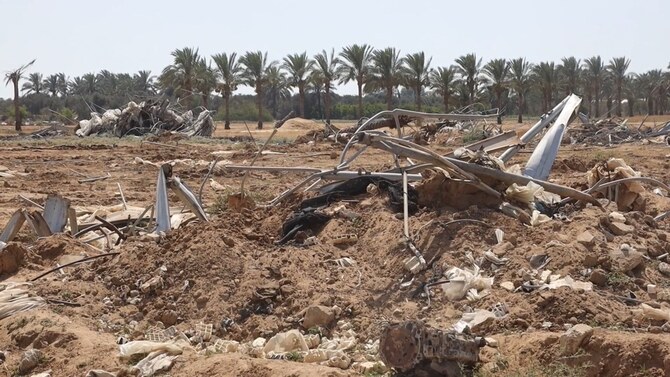DUBAI: Before the war, Mohamed El-Yaty, 39, a farmer from Deir Al-Balah in central Gaza, used to wake up and set to work at 6am, take a break at noon, return to his fields after Asr prayer around 4pm, and then work until Maghrib prayer after 7pm.
His entire life revolved around the routine of farming. But since the conflict in Gaza began on Oct. 7 last year, El-Yaty has been able to farm only about half his land, drastically reducing his yields of eggplants, cucumbers, peppers and tomatoes.
“Before the war, we had food — it was available and accessible,” he told an official from the Food and Agriculture Organization of the UN. “Meat, vegetables, everything was available. Good food. Today, everything is canned.”
El-Yaty said he has lost 22 members of his family over the course of the conflict between Israel and the Palestinian militant group Hamas — a war that has killed at least 40,000 Gazans, according to the local health ministry.

Even before the present crisis, up to 1.8 million people — one third of the Palestinian population — were considered food insecure. (AFP)
Many of the greenhouses that El-Yaty had tended on his 13 dunams of land — equivalent to about 13,000 square meters — have been destroyed by shelling. “My home was at my farm,” he said. “In the morning, my workers and I would harvest and plant, and we were 100 percent happy.”
Gaza was once largely self-sufficient in vegetables, dairy products, poultry and fish. It also produced a large amount of the fruit and red meat that its population consumed. Now the conflict has all but destroyed the enclave’s agrifood system, leading to poor nutrition and food insecurity.
A recent analysis by the FAO using satellite imagery found widespread damage to agricultural infrastructure throughout Gaza, including the destruction of at least 57 percent of its cropland, damage to 33 percent of its greenhouses, and significant damage to wells and solar panels.
Additionally, drastic shortages of water and fodder have resulted in the death of approximately 70 percent of the enclave’s livestock since October, while about 70 percent of Gaza’s fishing vessels have been destroyed.

Electricity shortages have also disrupted refrigeration, irrigation and incubation devices, severely affecting agricultural livelihoods. Today, only small-scale farming, fishing and animal husbandry continues — and only when security allows.
“Before the hostilities, a protracted conflict and frequent escalations in the Gaza Strip had already eroded the Gazan economy and the long-term sustainability of various sectors, including agriculture,” Abdulhakim Elwaer, FAO’s assistant director-general and regional representative for the Near East and North Africa, told Arab News.
Damage to agricultural infrastructure over the course of this latest conflict will have a long-term impact on Gaza’s post-war recovery. FAO figures suggest that up to 10 percent of the pre-war population had relied on agriculture as a main source of income.
“According to a recent World Bank report, this conflict will have lasting effects on the impacted populations in Gaza and the West Bank far beyond what can be captured in numbers alone,” Elwaer said.

Due to restrictions imposed by Israel on the delivery of humanitarian aid, Palestinians are not receiving sufficiently nutritious fresh food. (AFP)
Yousef Al-Masri, 53, a farmer from Khan Younis, lost his home in the fighting, forcing him to move to a place of safety three kilometers from his land.
Before Oct. 7, Al-Masri grew peppers, eggplants, cabbage, tomatoes and corn on his farm. Not only was it his main source of income — it was also a source of pride, dignity and identity. The war has robbed him of that role.
“Our conditions are very difficult in terms of everything: Electricity, water, houses,” Al-Masri told the FAO. “What more can I say … we are not going to find food — this agricultural season is gone. Next season we won’t find anything to grow.”
INNUMBERS
• 57% Gaza’s cropland damaged by the conflict (UN).
• 20% Gazans expected to face extreme hunger due to food insecurity.
Even before the present crisis, up to 1.8 million people — one third of the Palestinian population — were considered food insecure.
Of these, 1.5 million were severely food insecure, and 1.2 million of them were in the Gaza Strip, according to a 2023 report by the UN Office for the Coordination of Humanitarian Affairs.
Food insecurity was driven by high rates of poverty resulting from unemployment, which was in part due to Israeli restrictions on freedom of movement, as well as high prices for food and recurrent economic shocks.

The conflict has all but destroyed Gaza’s agrifood system, leading to poor nutrition and food insecurity. (AFP)
According to data published by the Integrated Food Security Phase Classification global initiative on June 25, about 96 percent of the population of Gaza will encounter high levels of acute food insecurity by September.
Under the present conditions, nearly half a million people are at risk of starvation, meaning that one in five Gazans already face extreme hunger and more than 20 percent are going entire days and nights without eating.
Due to restrictions imposed by Israel on the delivery of humanitarian aid, consisting of predominantly non-perishable canned goods, Palestinians are not receiving sufficiently nutritious fresh food.
In recognition of this nutritional shortage, the FAO, supported by the governments of Belgium, Italy and Norway, is delivering barley fodder to feed Gaza’s surviving livestock and increase milk production.

Gaza was once largely self-sufficient in vegetables, dairy products, poultry and fish. (AFP)
“Gazan farmers are ready to restart production given access to necessary inputs like seeds, plastic sheds for greenhouses, fodder, animal vaccines, fish feed and fuel,” Elwaer told Arab News.
The FAO’s priority, he said, “is importing and distributing fodder to sustain the 30,000 small ruminants still alive in Gaza, crucial for milk production essential for children’s nutrition and growth.”
The UN agency is also helping Gazan farmers to resume vegetable, meat and fish production, vital for food security and balanced nutrition, by scaling up efforts to deliver essential food production inputs.

Meanwhile, in the West Bank, ongoing settler violence, raids, property destruction and the confiscation of land has undermined agricultural activity, already hindered by limited access to natural resources, markets and essential services. This has led to an increased dependency on food imports.
But since Israel stopped issuing work permits after Oct. 7, Palestinians who previously traveled every day to work on Israeli farms have instead begun tilling the land in the West Bank.
About 200,000 Palestinians from the West Bank worked in Israel, legally or illegally, prior to the conflict, according to the Palestinian General Confederation of Labor. Many lost their livelihoods literally overnight.

The FAO’s priority “is importing and distributing fodder to sustain the 30,000 small ruminants still alive in Gaza, crucial for milk production essential for children’s nutrition and growth.” (FAO)
Working in agriculture in the West Bank has enabled many to make a living while also protecting their land from the encroachment of illegal Israeli settlements.
“It’s a very useful job and, above all, safe,” Hussein Jamil, a Palestinian farmworker in the West Bank, told the AFP news agency.
“We are independent and peaceful. It’s much better than working in Israel. Here we work on our land.”





























